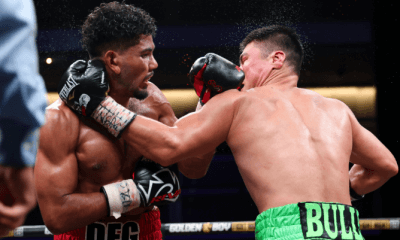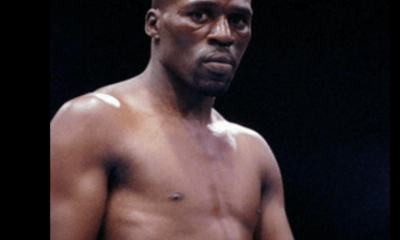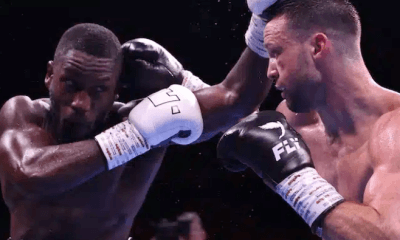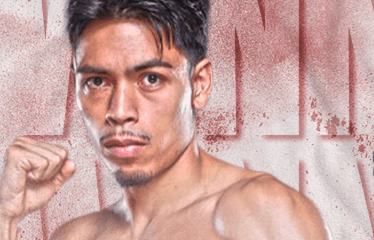Featured Articles
The Tony Weeks Brouhaha from the Vantage Point of a Fly on the Wall
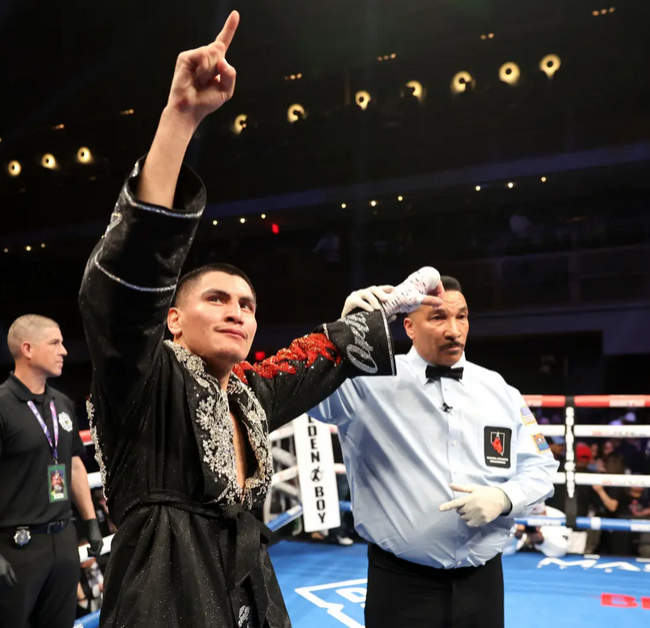
Referee Tony Weeks’ “premature” stoppage of last Saturday’s fight between Vergil Ortiz Jr and Fredrick Lawson at the Virgin (formerly Hard Rock) Hotel in Las Vegas fomented a firestorm of outrage that shows little sign of abating anytime soon. I feel duty-bound to share what I know as it lends credence to Weeks’ rationale for stepping in as quickly as he did.
Ortiz vs Lawson was the main event of a Golden Boy Promotions card live-streamed on DAZN. In case you missed it, Ortiz, who had knocked out all 19 of his previous opponents, was pummeling Lawson against the ropes when Weeks stepped in and waved it off with 27 seconds remaining in the opening round. As Dan Rafael noted, Lawson, who kept his gloves high, had not been knocked down or cut or even rocked.
The audience, as noted by TSS ringside correspondent David Avila, was stupefied. Indeed, a moment of stunned silence prefaced a resounding chorus of boos. TSS photographer Al Applerose, who had a perfect view of the action from his perch in the lower balcony, texted this reporter as things were being sorted out. “That was bullsh**”, he wrote. As veteran boxing writer Scott Christ noted, replays showed Weeks’ stoppage to be even more indefensible than it had appeared in real time which is seldom the case.
The Nevada Athletic Commission has a longstanding policy prohibiting ring officials from answering questions from reporters at events they work. Tony Weeks wasn’t interviewed in the ring, but told color commentator Beto Duran that he was prompted to stop the fight when he saw Lawson’s eyes roll up in his head. In Nevada, referees don’t have the option of issuing a standing 8-count.
The following day, in a post on his facebook platform, referee Weeks, his feelings undoubtedly wounded by the brickbats raining down on him, let the fur fly:
What the public didn’t know that prior to the fight they did a brain scan on him, and it came up that he had an aneurism, and they did the test again, and the same aneurism came up. Another doctor was brought in and gave him the same examination and he tested negative for the aneurism, so they cleared him to fight.
The facebook post was quickly deleted. However, CompuBox co-founder and podcaster Bob Canobbio caught a screenshot of it before it disappeared.
Nevada regulators took umbrage at Weeks’ allegation and issued a swift rebuttal. “The health and safety of the unarmed combatants in the State are paramount to the Commission. All the contestants in the event were subject to full medical examinations and were cleared by medical experts to compete without restrictions,” read the formal release.
—
On Saturday night, on the way to the arena, I made a pit stop at a men’s room in the casino. While standing at a urinal, I became the proverbial fly on the wall.
The urinal that I used was the closest to the sink where one washes his hands before leaving. At the sink, two men were conversing. One of the men, after telling the other that he had gone golfing that morning with Oscar De La Hoya, said “we almost lost the main event tonight,” or words to that effect.
I wanted to know more. “What happened?” I inquired.
The man shot me a dirty look, a wordless earful, as it were, for intruding on a private conversation. “Nothing happened,” he said brusquely, and walked away.
But something obviously did happen and, if one trusts Tony Weeks’ veracity (and I do), it had something to do with Fredrick Lawson’s fitness to fight.
—
Tony Weeks, 67, is in his third decade as a professional boxing referee. His most famous assignment came in 2005 when he was the third man in the ring for the first fight between Diego Corrales and Jose Luis Castillo, a match that many grizzled reporters in attendance anointed the greatest fight of all time. “Weeks doesn’t take a back seat to anyone in terms of competence,” wrote Kevin Iole, looking back at that fight. “An overzealous referee could have ruined what would become a boxing classic.”
Later in the year 2005, Weeks had the misfortune of refereeing a fatal fight. Jesus Chavez wrested the IBF lightweight title from Leavander Johson on an 11th-round stoppage. A 35-year-old father of four, Johnson left the ring on his own power, but collapsed in his dressing room and died five days later at a Las Vegas hospital without regaining consciousness. Weeks would say that he gave serious thought to quitting the sport after this heart-wrenching incident.
Weeks’ stoppage of the Ortiz-Lawson fight was his second high-profile misadventure in eight months. In May of last year, at the Cosmopolitan in Las Vegas, he had provoked the ire of boxing fans by waving off the fight between Rolly Romero and Ismael Barroso in the ninth round, awarding the fight to Romero even though Barroso wasn’t hurt and was winning on the scorecards.
In the aftermath of that fight, in a conversation with NY Fights founder Michael Woods, Weeks acknowledged something that few in his profession would have the courage to say for public consumption, namely that there is a double standard and that some competitors, because of certain circumstances, are on a short leash. “[When] a fighter is at an advanced age,” said Weeks, referencing the 40-year-old Barroso, “you’re going to look at him a little harder than the other fighter.”
Now, presumably, it is Weeks who is on a short leash. It will be interesting to see how long it will take before he is given another top-of-the-marquee fight in Nevada, if ever.
I am not here to defend Weeks’ controversial stoppages. However, I do know one thing. If I had a son or a daughter who was entering the prize ring tomorrow, I would sleep better knowing that Tony Weeks was the referee.
To comment on this story in the Fight Forum CLICK HERE
-

 Featured Articles3 weeks ago
Featured Articles3 weeks agoThomas Hauser’s Literary Notes: Johnny Greaves Tells a Sad Tale
-
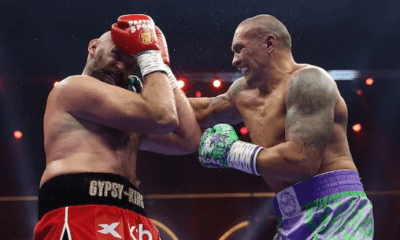
 Featured Articles2 weeks ago
Featured Articles2 weeks agoBoxing Notes and Nuggets from Thomas Hauser
-
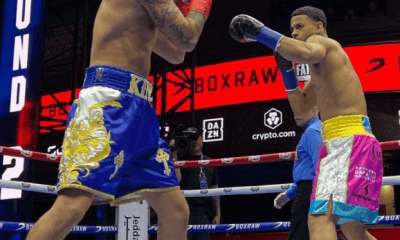
 Featured Articles4 weeks ago
Featured Articles4 weeks agoRolly Romero Upsets Ryan Garcia in the Finale of a Times Square Tripleheader
-
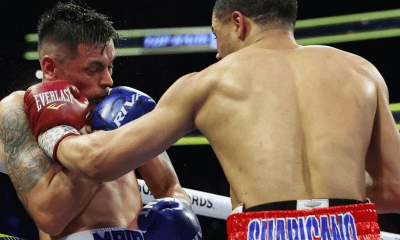
 Featured Articles4 weeks ago
Featured Articles4 weeks agoUndercard Results and Recaps from the Inoue-Cardenas Show in Las Vegas
-
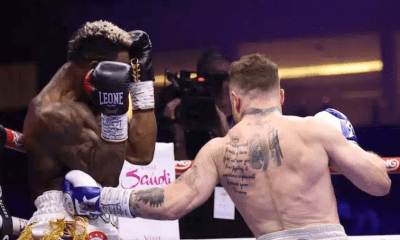
 Featured Articles4 weeks ago
Featured Articles4 weeks agoCanelo Alvarez Upends Dancing Machine William Scull in Saudi Arabia
-
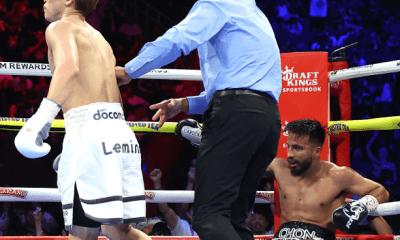
 Featured Articles4 weeks ago
Featured Articles4 weeks agoBombs Away in Las Vegas where Inoue and Espinoza Scored Smashing Triumphs
-
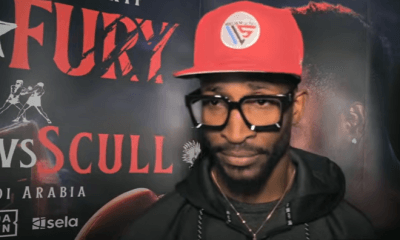
 Featured Articles4 weeks ago
Featured Articles4 weeks agoArne’s Almanac: The Good, the Bad, and the (Mostly) Ugly; a Weekend Boxing Recap and More
-
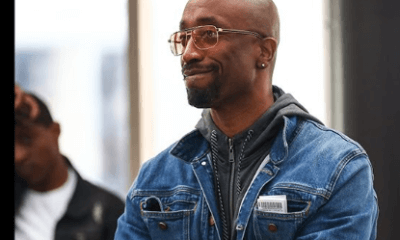
 Featured Articles3 weeks ago
Featured Articles3 weeks ago“Breadman” Edwards: An Unlikely Boxing Coach with a Panoramic View of the Sport

